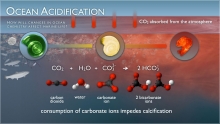- You are here:
- GT Home
- Sciences
- Home
- List of Available Research Projects
The student will work jointly between the labs of Drs. Frank Stewart (Biological Sciences) and Kostas Konstantinidis (Biological Sciences, Civil and Environmental Engineering) to characterize a globally important marine bacterial group (SAR11). A collaboration between these labs recently described how SAR11, the world’s most abundant organismal group, has adapted to the unique chemical and physical environment of anoxic oxygen minimum zones (OMZs). This work (Tsementzi et al.
CO2 emission will continue exaggerating, as fossil fuels will most likely remain the major source of energy in next couple decades. The increased carbon in the atmosphere moves into marine ecosystems, making the world’s oceans more acidic. The rate of ocean acidification (OA) today is faster than any time in the past 300 million years.
Plastic marine debris or the plastisphere impacts marine organisms through ingestion, entanglement, and as a source of toxic chemicals. The plastisphere could also have a major impact on biogeochemical cycles in the oceans. Plastics are transported via major ocean currents to central gyres, where they reside for decadal time scales. The amount of plastic waste is large, exceeding 2 kg/ km2 in central gyres. Even the most recent ocean surveys cannot account for the amount of debris estimated to enter the ocean, with inputs and outputs differing by orders of magnitude.




